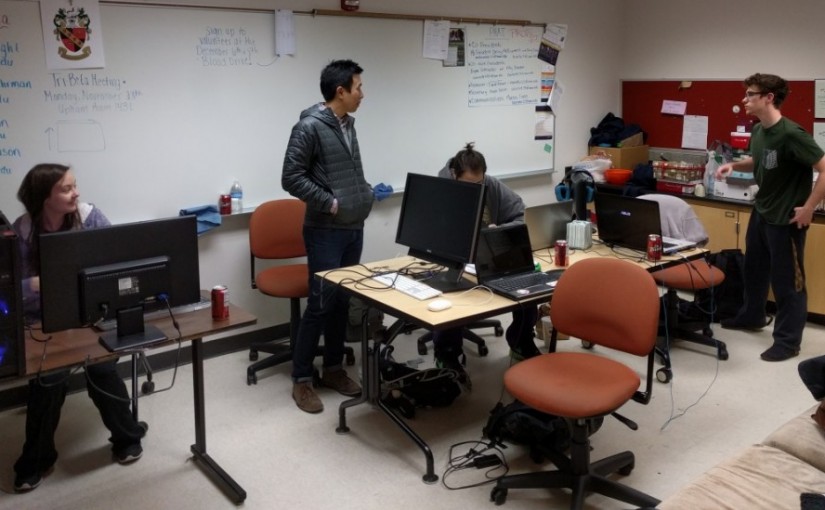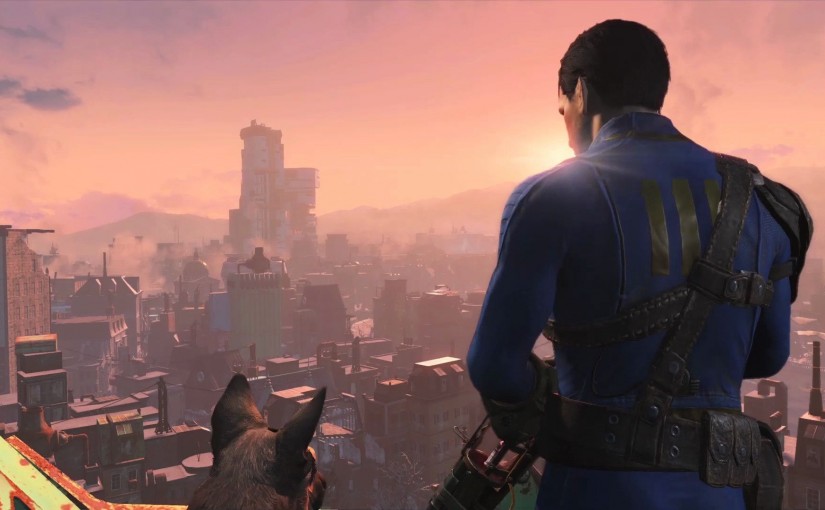Bleh, it has been a long road from the start of the Hackathon to typing at my keyboard about the event. This was my first game jam and I was awake a full 24 hours (and beyond), I got sick, and wrecked my sleeping schedule all in order to make a game that only ended up being partially finished. I wouldn’t change a thing. Even with all of its drawbacks, the experience was extraordinary and I wouldn’t trade it for anything.
Forgive me if this post is a little rambly and all over the place and less professional than some of my other posts. I’m still dealing with the aforementioned sickness and lack of sleep which, surprise! Makes it really hard to think straight.
Anyways, the beginning is probably the best place to start. Our team consisted of 3 programmers/designers, a narrative designer (me), and a visual artist. We trekked together over the hall in which the event was being held and set up all of our computers and various equipment in one of the rooms. We brought a coffee machine which proved to be an excellent morale booster. Anyways, the premise for our game was a series of short and easy to understand mini-games that up to four players could pick up and play. We started with an original goal of making 10 mini games, but ended up scaling back to 5, and then down to 3 games as our deadline grew nearer and we continually ran into various problems or issues that bogged down progress. The programmers tell me that the back-end programming, as well as programming for 4-players, was a real pain.

The game was called Mini Mages and its narrative premise was that of four novice mages applying for an apprenticeship with a renowned grand mage. A lot of the content I had written for the game didn’t make it due to time constraints, but that’s just game development. Things will always have to be cut for the sake of deadlines and or other restrictions. Speaking of restrictions one of the ones I found challenging while writing for the game was my restriction on the length of content. We wanted the game to feel fast-paced and frantic and we wanted to use a typewriter effect that scrolled text in. Combined with the limitation of having the screen with text appear for a limited amount of time to keep with the quick pace of the game all of my written content had to be around 100 – 120 characters. Not words, characters! My skills to write with brevity were pushed to limits. (Unlike now where I’m just spewing info at you.) It was hard, but it got done eventually. After that, I spent the rest of the night supporting the real heroes (our programmers and visual artist) by looking for free audio we could use, due to a lack of time to create our own, and by making sure everyone was stocked with snacks, coffee, and energy drinks.
Anyways, long story short it was a lot of fun. We made 3 mini games for our game and we got 3rd place out of the other competitors. All in all, not a bad day/night.
I’d highly encourage you to look for game jams in your area and or create your own. They’re great fun especially when you’re surrounded with your friends and working on something that you are all greatly passionate about.
Now I am going to resume sleeping in hopes that eventually I’ll wake up without a headache or feeling sick in general.
P.S. Still worth it
By the way here is the video of our presentation:
https://www.youtube.com/watch?v=SHdUVcHGy7g









